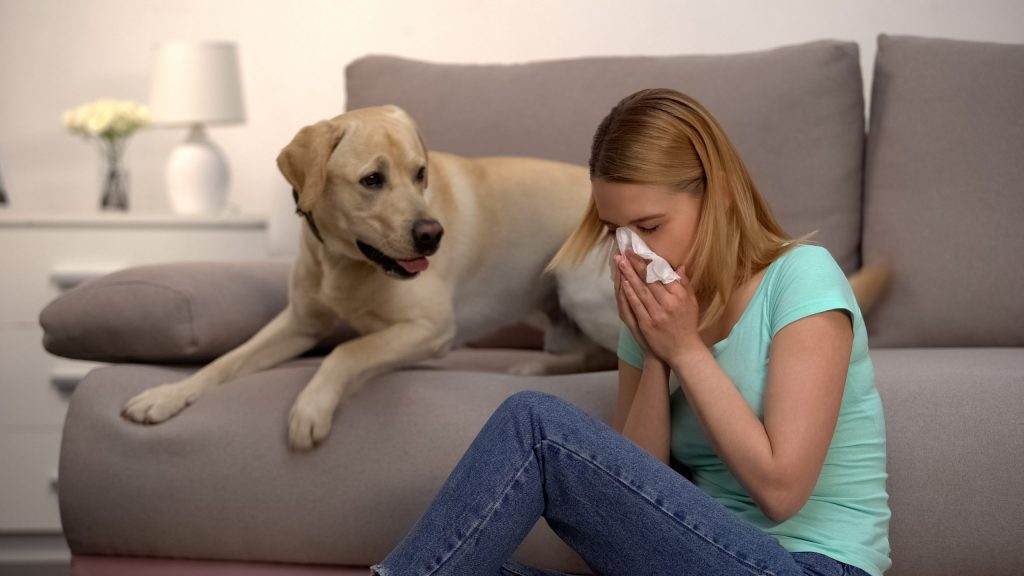Being a reputed breed, Labrador retrievers are wanted by almost everyone. Their even temperament, trustworthy, and social nature makes them the perfect family dog. Therefore, people with some form of allergies often wonder if Labradors are suitable for them or not. In fact, one of the most common questions dog lovers tend to have about Labrador retrievers is: Are they hypoallergenic?
Well, unfortunately for them, no. Labradors are not hypoallergenic. They do have the potential to cause allergic reactions. If you are well aware of this breed, you must know that being working dogs, Labradors have a double coat that sheds a lot, especially during shedding seasons. The abandoned fur has all the potential to trigger reactions in people with pet allergies.
Sadly, in the United States, at least 3 out of 10 people suffer from pet allergies. Consequently, many dog lovers cannot own a Labrador retriever even if they wish to. Symptoms like itchiness, continuous sneezing, running nose, and others won’t allow them to take such a step.
To mitigate allergic reactions from Labs, some people try to create hypoallergenic versions by interbreeding Labradors with dogs like Poodles. However, truth to be told, there is nothing called a hypoallergenic dog. Even the supposed hypoallergenic dogs can cause allergies because fur is not the only source of allergic reactions. Some individual proteins found in dogs’ urine or saliva can also trigger allergic reactions.
We will discuss it in more detail in the coming sections. So, read ahead and gratify your curiosity.
Shedding : A major limitation of owning a Labrador

There is no question of denying the fact that Labrador retrievers shed a lot. And by lot, we really suggest a lot. Some ardent fans of Labrador retrievers may try to defend their favorite breed by saying that they shed only twice a year.
But the reality is they shed all round the year, and during shedding seasons, they completely leave their coat. It is like a snake leaving its outer skin. However, one thing is true that they do not shed too much during the other parts of the year. Whatever they shed can be tolerated if regular and proper clean up is done. You can also try to limit your dog’s shedding issue by taking specific measures.
Some people, mainly critics of Labrador retrievers, believe that Labs can definitely cause allergic reactions because they shed. Therefore, they are the worst choice for those who are looking for family dogs. Seekers of family dogs should look for hypoallergenic dogs.
Interestingly, these criticisms do not have any effect on the ever-growing popularity of the Labrador retrievers. Still, in defense of the breed, we will like to say two things. First, Labradors are the most even-tempered dogs and, therefore, definitely perfect for families. And second, fur is not the only source of pet allergies. There are other sources, as well. Those who have severe allergies from pets must ascertain precisely what it is about dogs that cause allergic reactions. The fur may not be the cause.
What leads to Pet Allergies?
By now, you might have understood that people consider Labradors allergenic because of their shedding issue. It follows that allergic reactions are directly related to the animal’s fur. Therefore, if someone brings a dog that doesn’t shed, there will be no allergic reactions. As a result, they will have a hypoallergenic dog.
Regrettably, this is not really true. Allergic reactions can be caused by other attributes of dogs as well. According to Dr. Ted Myatt of Environmental Health & Engineering, people experience allergic reactions when exposed to the pet allergens that have become airborne from the dried saliva and fur dander. It typically happens when children jump on the sofa, or we throw the dog bed somewhere by mistake.
Apart from dander and fur, people can have allergic reactions from the dog’s slobber, poop, urine, and mucus. The microscopic particles of these byproducts hover in the air like pollens, and when someone inhales that air, they experience allergic reactions.
The above discussion follows that people can have allergies from other dog byproducts apart from the hair. Consequently, if you have pet allergies, you can experience reactions by remaining in close contact with non-shedding dogs as well.
Dogs that are less likely to cause allergic reactions
Now that you have understood the exact source of pet allergies, you must know that not all Labs are likely to trigger the same problems in people. To be more precise, allergic reactions do not depend on the breed as a whole. They rely on a combination of diverse determinants. It is possible to have allergic reactions from specific dogs while not from others, despite them belonging to the same breed.
According to Dr. Myatt, no studies have proven that a dog or cat breed is completely hypoallergenic. What truly exists in the name of investigations is a probability. Specific dog breeds are said to be more susceptible to allergens than others. Therefore, your immune system may experience allergic reactions from one Labrador while having no issue with the other. The same is the case for non-shedding dog breeds.
However, one thing is true that because Labradors shed so much, they are more susceptible to allergens than other dog breeds. Before you jump to any conclusion, it must be noted that this argument is purely based on statistics and probability. There is no guarantee in this statement.
According to the American Kennel Club’s recommendations, the following dog breeds are less susceptible to allergens:
- American Hairless Terrier
- Afghan Hound
- Coton de Tulear
- Bedlington Terrier
- Kerry Blue Terrier
- Lagotto Romagnolo
- Giant Schnauzer
- Chinese Crested
- Bichon Frise
- Maltese
- Irish Water Spaniel
- Spanish Water Dog
- Soft Coated Wheaten Terrier
- Portuguese Water Dog
- Poodle
- Peruvian Inca Orchid (Hairless)
- Standard Schnauzer
- Xoloitzcuintli
However, as mentioned earlier, no breed can be guaranteed to be hypoallergenic. Even the dogs mentioned in the above list can trigger allergic reactions. If you are sure you have pet allergies, try to spend some time with a dog. It will help you to ascertain exactly which byproducts of dogs trigger such problems in you.
How to live with your dog if you have pet allergies?

Well, there is no question of doubting the fact that Labradors are one of the most loved dog breeds. Therefore, it won’t be a mistake to assume that some of you are still interested in adopting a Labrador despite knowing its potential for triggering allergies.
To be honest, it will be a bit difficult to live with your Labrador if you are seriously allergic to pets. However, it is not something impossible. By introducing specific changes in your lifestyle, you can, in fact, thrive with your Labrador retriever. The following are some important tips that can reduce a Labrador’s effects on your immune system.
- Groom, your dog
You cannot mitigate your Lab’s shedding issues. Being a dog made for surviving in extreme conditions, it is bound to shed. However, you can definitely do something to limit this problem. Brushing is one of those things. To ascertain that your dog’s hair does not scatter around your house, you need to brush it twice a week. During shedding seasons, regular brushing is recommended. Besides that, you have to look after your Labrador’s skin. You can use a de-shedding tool for this purpose. It will help you to remove your dog’s fur without causing any harm to its skin. - Bathing
Besides brushing, you need to give your Lab a regular bath to remove the excess hair. While bathing your dog, massage its skin thoroughly to wash away the dander. Use some special shampoo to remove bacteria and viruses from your Lab’s coat. You can also find some anti-allergen shampoos in the market. Use them to clean your dog’s skin. - Separate bedding
Do not allow your dog to climb on your bed or to sleep with you. Generally, a human being sleeps for six to eight hours. If you let your Labrador sleep with you for such long hours, you will invite danger yourself. Such a long exposure to your Labrador’s fur can trigger your allergies and adversely affect you. Therefore, it is more salutary to arrange a separate bed for your dog. Besides that, keep your dog’s bed clean. If you cannot wash it yourself, give it to the laundry. - Vacuum your house
Regular cleaning of your house is a must. Ascertain that you have a high suction vacuum cleaner designed to reach every nook and corner of your home. Besides that, try to purchase a portable vacuum cleaner or a cleaner specially designed to collect dander or animal fur. Do not worry. You won’t have much problem finding one. If it is you who has a pet allergy, wear a mask while cleaning the house. Ascertain that you don’t, by any chance, inhale the dust and hair. - Use light curtains and carpets.
To ascertain that your dog’s hair does not get stuck anywhere in your house, purchase only lightly designed carpets and curtains. It will be more convenient for you to clean the house if you have fewer carpets. However, if your climatic conditions make it mandatory to cover your floor with carpetings, purchase a tightly weaved one. Ensure that you clean the mattings with steam regularly. If possible, use scatter-rugs and clean them regularly with hot water. - Wash your dog’s objects
Objects like play toys, beds, etc. tend to contain your dog’s fur, saliva, urine, and other allergens sources. To avoid any adverse reactions, make sure that you wash your dog’s belongings twice a month. To remove viruses and bacteria from your Lab’s objects, wash them with hot water. - Put some limitations on your dog’s movements.
Do not allow your dog to every corner of your house. Some parts of the home must remain free from the residues of a dog. One of those parts is your bedroom. Generally, people tend to spend a large amount of their day in the bedroom. Therefore, do not allow your dog to your bedroom. If you keep your room free from your Lab’s saliva, dander, poop, and hair, you will have at least one safe haven to avoid allergies. - Change your clothes
It is advisable to not spend so much time with your Labrador if you have allergies. However, if you insist on it, ensure that you take some important precautions. Some of them are having a bath and changing clothes every time you interact with your Labrador. - Consult a doctor
Once you have taken all the precautions to limit your dog’s allergic impact, consult your doctor. Have a detailed discussion and request some treatment or medicines to control the allergic reactions on a medical level. - Filters and Air Purifiers
Think about purchasing allergy and asthma-friendly air purifiers and filters. Operating an air purifier for five to six hours a day can diminish many allergens floating in your home’s atmosphere.
Will shaving my dog fix my problems?

By now, you might have understood that your dog’s fur is not the only cause of your allergies. So, the answer to this question will be no. Shaving your Lab will not fix your problem. Even if you remove your dog’s fur, you can have allergic reactions from its urine, feces, mucus, or slobber.
Besides that, shaving your dog’s hair can further aggravate your allergies. A Labrador’s coat is meant for insulation and protection of its skin. If you shave the coat, its skin will provide breeding grounds for dry patches, parasites, and rashes. Moreover, shaving your dog’s hair will only shorten the fur size and not remove it permanently. You won’t even be able to clean the hair from your surroundings during your dog’s shedding seasons as short hair are hardly visible to the naked eye.
Symptoms of Pet Allergies
If you wish to own a Labrador and don’t know if you have pet allergies or not, try to spend some time with a dog with a double coat. Look for the following symptoms to verify if you are allergic to dogs or not.
- Itchiness in your skin and eyes.
- Redness or irritation in your skin when you hold a dog.
- Hayfever
- Rashes on your face, neck, or upper portion of your chest.
- Sneezing, coughing, and runny nose.
- Wheezing or asthma.
Is it safe to own Labradors despite having allergies?
To be honest, all of it will depend upon your health and choice. If you are severely allergic to dogs and still want to own a Labrador, we recommend meeting your allergy specialist first. Even though we have no doubt that your doctor will advise you not to have a pet, you must stand your ground. Once your doctor is clear that you insist on having a Labrador, they will suggest you some medicines and precautions to deal with your allergies.
However, if your specialist doesn’t listen to you at any cost, you can consider owning any of the less susceptible breeds mentioned above. But if your heart is not satisfied with any of those breeds and you insist on having the Labrador genes, only one option is left before you. Adopt a Labradoodle.
These mixed breed dogs have been produced by interbreeding Labradors and Poodles. The latter is considered as a less allergen-friendly breed by the AKC. Consequently, you are less likely to experience allergic reactions. However, ascertain that your Labradoodle has a poodle coat. Otherwise, it won’t be much different than owning a Labrador retriever.
Conclusion
As far as Labradors are concerned, then yes. They can engender allergic reactions. But that does not imply that other dogs do not cause allergic reactions. The matter is of probability and not of any dichotomy between allergenic and hypoallergenic dogs. In other words, some dogs are more likely to trigger allergies than others.
Besides that, the allergic reactions are likely to be different in different dogs and people. Therefore, even the so-called hypoallergenic dogs are not really hypoallergenic.
On the question of owning a Labrador retriever despite suffering from allergies, we will recommend you to consult your doctor first. You must know how serious it can get if you own a dog. If the issue is not likely to get too problematic, you can consider living with a Labrador by adhering to the precautions mentioned above. Otherwise, you are better off a Lab.
Table of Contents





